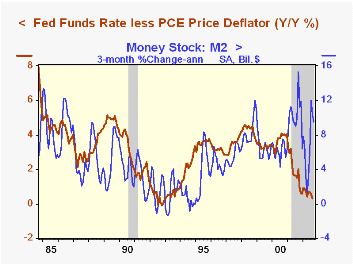 Global| Oct 28 2002
Global| Oct 28 2002Setting Monetary Policy
by:Tom Moeller
|in:Economy in Brief
Summary
Setting the course for US monetary policy is the job of the Federal Reserve System. The arduous task is complicated by the myriad relationships, most of them lagged, amongst financial and real economic variables. The Fed starts by [...]

Setting the course for US monetary policy is the job of the Federal Reserve System. The arduous task is complicated by the myriad relationships, most of them lagged, amongst financial and real economic variables.
The Fed starts by setting short term interest rates with the goal of influencing the money supply, or liquidity, and ultimately the economy. The money supply is, however, misnamed. It's really the money stock which is determined through the interaction of money demand (which markets determine) and money supply (which the Fed determines).
The accompanying graph shows two indicators of monetary policy, the real Fed funds rate and growth in M2, to now be suggestive of an accommodative policy. The question, as always, is whether extraneous factors are influencing the efficacy of that policy.
The Federal Open Market Committee next meets on November 6th.
For a discussion by the St. Louis Federal Reserve Bank of economic forecasts and the influence on monetary policy, click here.
For a discussion by the San Francisco Federal Reserve Bank about setting interest rates, click here.
| Fed Funds Target Rate | Sept | Aug | Sept '01 | 2001 | 2000 | 1999 |
|---|---|---|---|---|---|---|
| Target | 1.75% | 1.75% | 3.25% | 3.90% | 6.24% | 5.00% |
Tom Moeller
AuthorMore in Author Profile »Prior to joining Haver Analytics in 2000, Mr. Moeller worked as the Economist at Chancellor Capital Management from 1985 to 1999. There, he developed comprehensive economic forecasts and interpreted economic data for equity and fixed income portfolio managers. Also at Chancellor, Mr. Moeller worked as an equity analyst and was responsible for researching and rating companies in the economically sensitive automobile and housing industries for investment in Chancellor’s equity portfolio. Prior to joining Chancellor, Mr. Moeller was an Economist at Citibank from 1979 to 1984. He also analyzed pricing behavior in the metals industry for the Council on Wage and Price Stability in Washington, D.C. In 1999, Mr. Moeller received the award for most accurate forecast from the Forecasters' Club of New York. From 1990 to 1992 he was President of the New York Association for Business Economists. Mr. Moeller earned an M.B.A. in Finance from Fordham University, where he graduated in 1987. He holds a Bachelor of Arts in Economics from George Washington University.
More Economy in Brief
 Global| Feb 05 2026
Global| Feb 05 2026Charts of the Week: Balanced Policy, Resilient Data and AI Narratives
by:Andrew Cates






